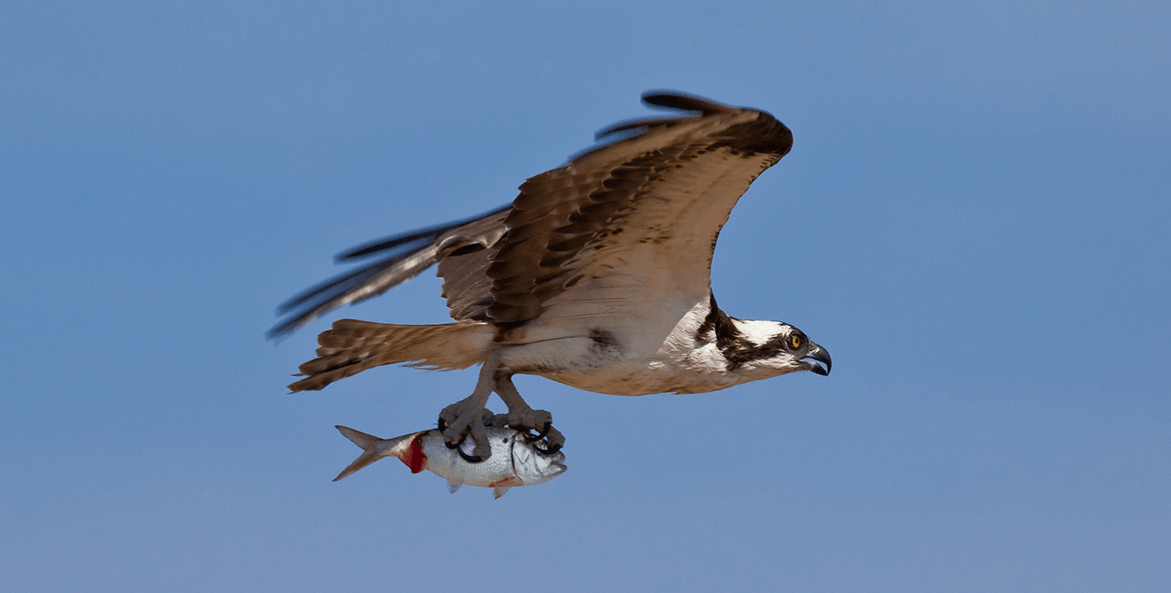Before starting at CBF more than a decade ago, I’d never actually heard of Atlantic menhaden nor of their superhero-like role in the Chesapeake Bay ecosystem. But I had enjoyed countless summer evenings at water’s edge, hearing the familiar cries of ospreys feeding their young and teaching them to fly. I’d savored hearty meals of beautifully grilled rockfish. I’d swum in vibrant Bay waters beaming with life.
Quickly I learned that menhaden made all of these moments possible—the swoop of the osprey, the thick, healthy striped bass for dinner, even the awe-inspiring leaps of humpback whales near the mouth of the Bay. As a keystone species, menhaden are vital food for many of the creatures that make the Chesapeake ecosystem so unique. This seemingly unexceptional fish is anything but. Menhaden are at the very core of what makes the Bay work—the beautiful, rhythmic hum of its whole system.
Despite its importance to the Bay’s ecosystem, menhaden face substantial pressure from the commercial fishing industry—mostly from one company named Omega Protein, a subsidiary of international conglomerate Cooke, Inc. And though advances in fishery management have improved our understanding of menhaden as a coastwide stock, much remains unknown about the impacts of this industrialized harvest within the Bay.
In yet another setback for this underdog hero, Virginia legislators punted until next year a bill that would have funded a robust study of the Bay’s menhaden population. In doing so, critical science needed to make informed decisions about “the most important fish in the sea” has been delayed once more.
This seemingly unexceptional fish is anything but. Menhaden are at the very core of what makes the Bay work—the beautiful, rhythmic hum of its whole system.
“This is supremely disappointing,” says CBF Virginia Executive Director Chris Moore. “The lack of a menhaden study leaves far too many questions unanswered and far too many of the Commonwealth’s resources expended over the last year wasted. The bill simply asks the General Assembly to start the work of funding the consensus-based research recommendations. By opposing funding for these important research questions, Omega Protein once again proves they are not acting in good faith for the Chesapeake Bay, but rather only for their own pockets.”
So, what happened?
It is hard to say, given that during the 2023 General Assembly session, lawmakers from both parties passed legislation charging the Virginia Institute of Marine Science with developing a process to understand the factors that may be impacting the local menhaden population. Progress looked promising, and even Omega Protein backed that legislation. Over the summer, staff from the Virginia Institute of Marine Science and Virginia Marine Resources Commission gathered a diverse coalition, including representatives from Omega Protein, the Chesapeake Bay Foundation, and others, that produced nine consensus recommendations on what should be included in a menhaden study.
HB 19, introduced during this year’s legislative session by Delegate R. Lee Ware, would have funded that research and helped begin to resolve pressing questions shared by anglers, birders, and scientists: What’s the current health of the Chesapeake Bay’s menhaden population and how are factors such as climate change and industrial fishing affecting them? However, the House of Delegates Studies Subcommittee unanimously—and with no discussion—pushed consideration of House Bill 19 into next year.
Why should I care? Why are menhaden important?
Arguably “the most important fish in the sea,” menhaden are small, oily, and packed with nutritional might. They are a critical link in the Chesapeake Bay food web, feeding striped bass (or “rockfish” or “stripers”), bluefish, ospreys, whales, and dolphins that thrive on this highly nutritious prey.
But the same qualities that make menhaden a prized food for marine wildlife, have also long made them a target for the reduction industry in the Chesapeake and Atlantic Coast. Since colonial times, menhaden have supported one of the largest commercial fisheries along the Atlantic coast. Used for cosmetics, nutritional supplements, pet food, and other consumer products, the menhaden “reduction” fishery is responsible for the harvest of hundreds of thousands of metric tons of menhaden each year.
And while this fishery has been around for centuries with reduction plants at one point dotting the East Coast, Virginia is the only state that continues to allow reduction fishing for menhaden in its state waters. Only one plant remains based in Reedville, Virginia, operated by Omega Protein. In fact, today, nearly 75 percent of all commercial menhaden harvest is landed in Virginia. All other states have banned the practice. This concentration of fishing effort in one of the nation’s most productive and important nursery areas for commercial and recreational fish species—particularly striped bass—has long been a concern for anyone who cares about the Chesapeake Bay.




